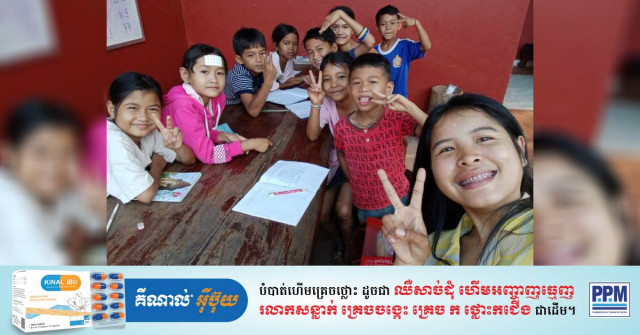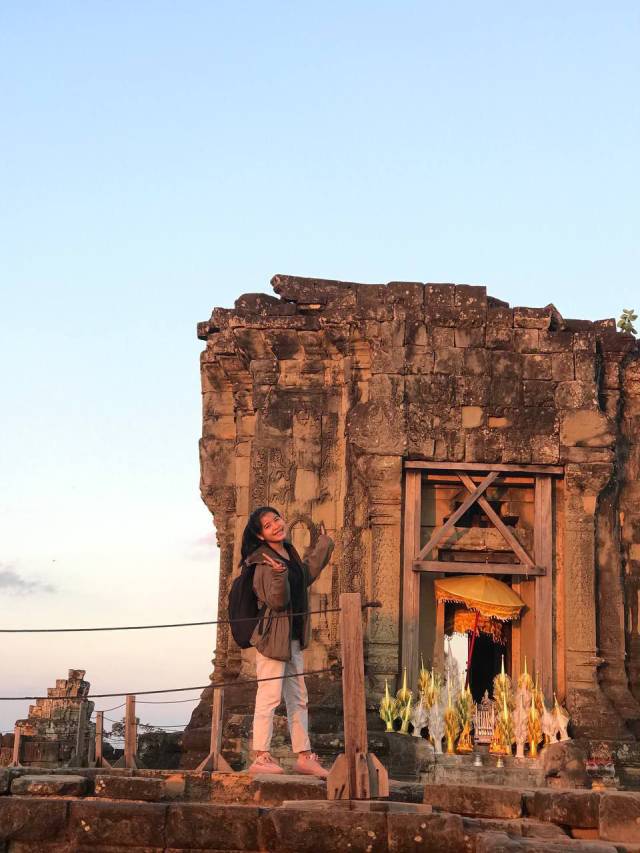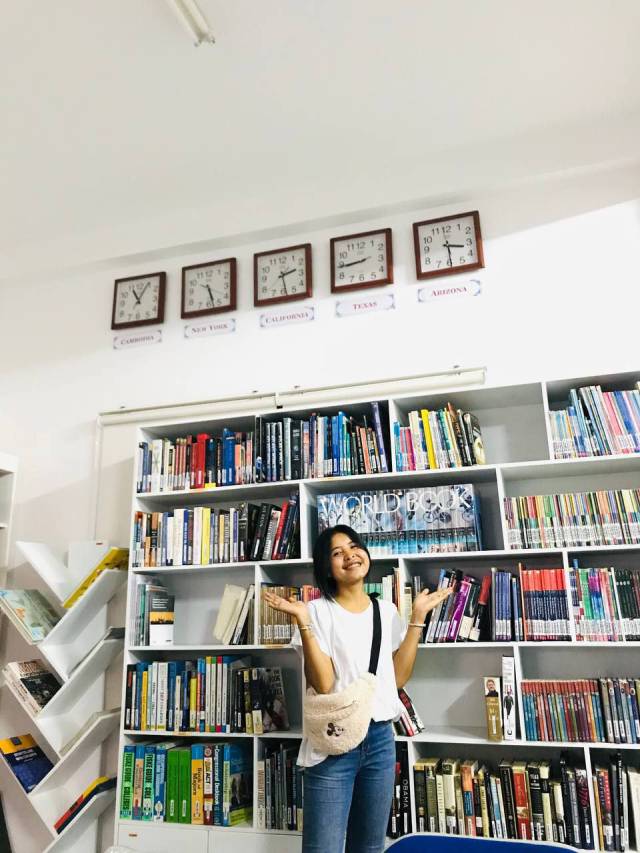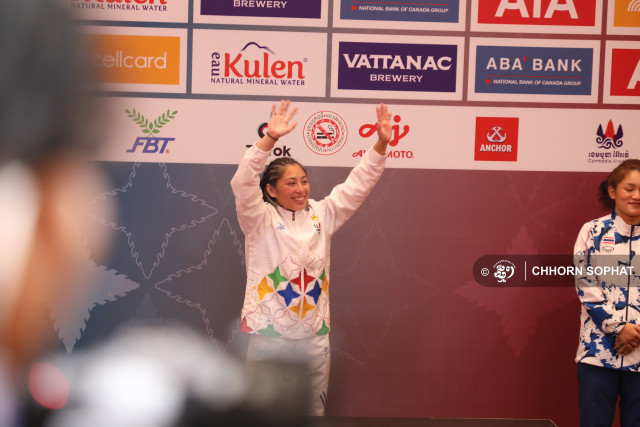Leadership Program Persistance Pays for Sreymoch

- By Rin Ousa
- March 7, 2024 3:25 PM
PHNOM PENH – Inspired by Nobel Peace Prize winner Nelson Mandela’s quote “a winner is a dreamer who never gives up,” Samrith Sreymoch has finally been selected to participate in the Young Southeast Asian Leaders Initiative (YSEALI) in the US after four failed attempts.
The five-week academic program is designed to bring exceptional young leaders from Southeast Asian countries to the US for academic enrichment and cultural exchange.
Sreymoch’s fellowship will start on April 20, with the theme of Civic Engagement at the University of Nebraska at Omaha.
Originally from Siem Reap province’s Banteay Srei district, Sreymoch is a fresh graduate from the University of South-East Asia, majoring in teaching English as a foreign language.
She has turned her past failures in applying for the YSEALI Academic Fellowship into success.
“After several failures, I had no motivation to go on. I got quite depressed and disappointed for not giving it my all. However, I have really come this far. I should give it another try,” Sreymoch said.
“I did not apply for the Civic Engagement theme at the right place. The first two times, I challenged myself to apply for Entrepreneurship and Economic Development as I intended to explore new things related to business beyond the field I am learning.
“Later on, I discovered my potential and got the picture of which candidate the committee was literally looking for. Thus, I shifted to choose the Civic Engagement theme.
As this program encourages successful candidates to carry out activities, services or programs that benefit society, Sreymoch said what went wrong during the previous attempts was that her project was too broad.
Another weakness was her English proficiency. Born in a rural areas, Sreymoch said she found learning English challenging as not many study opportunities were available where she lived.
Every time she wanted to give up, she remembered why she applied in the first place. With her strong commitment and dedication, Sreymoch turned her weaknesses into strengths.

“I put more effort into learning to speak and write English this time. Additionally, I came up with another project in which I put all my soul into writing,” Sreymoch said.
“Unlike every other time, I was eager to pass the application process in this fifth try. I remembered I was looking forward to seeing the email from the US Embassy every day. Once I got the email, my tears almost fell and my parents were really proud of me.
“Almost everyone in my community heard this good news and they were impressed by my ability as no one in this community has got the opportunity to go to the US before.”
Sreymoch was not surprised when no one asked her for tips to apply for this program as higher education is not the top priority in her community.
She said most of the girls there married at young ages. Male teenagers drop out from school and find work to earn a living.
“I am very grateful for this opportunity given and I intend to contribute to my community after coming back,” she said.
Learning English journey
Although Sreymoch was born and raised in an isolated village, she did not give up on learning English.
Unlike others, she started to learn English just when she was in tenth grade.
“I rode my bike every day to English school and came back home at 9pm or 10pm. I found it very challenging but I had no choice as there were no English schools in my small community,” she said.
Two years later, she took a short suspension as she had to put all her focus to the baccalaureate examination.
By understanding the importance of learning English, Sreymoch pursued teaching English as her bachelor’s degree.
Good things come to those who never give up. After four years of effort into her bachelor’s degree, Sreymoch was fully funded by the International Organization for Migration (IOM) to learn hospitality at Paul Dubrule Hotel and Tourism School for three months and internship at one hotel in Thailand for another three months.
“Thanks to IOM support, I was able to enhance my English skills not only within my country but also in our neighboring country,” she said.
To help her community as well as improving her English skills, Sreymoch is active in civic engagement in her community by volunteering at libraries, especially teaching English free of charge to children.
A struggling woman with a big heart
Sreymoch recalled when she decided to teach English to children in her community free of charge.
From personal experience, she knew how hard it was to learn English in her community. Thus, she intended to see young children having adequate access to learning English.
She started teaching with a group of children by arranging space in her house to teach on weekends.
“Everyone in the community was not scared about COVID-19 as we live in such an isolated area. We rarely flocked into the city so there were not many cases in my community,” she said.
“I was excited to see their parents accompany them to my house to learn English. It was my motivation to keep going on with my teaching as not many parents encouraged their children to pursue education in the past.
“Due to my personal compacted schedule, I quit teaching for one year and just resumed again last year.”
Sreymoch said her class is still free and now has 14 children.
She also takes classes including math and Khmer, in which cases she asks for only a small amount from their parents to buy teaching materials.
“That’s how I can help them and my small community. After coming from the US, I will still keep teaching them and make more space to create a small library for them to read more about English,” Sreymoch said.
“Creating a library is my project I filled out in the YSEALI program application form. I was excited that the committee was interested in my project. I don’t just apply for my own, yet I care about young people in my community.
“I came up with that project with the bottom of my heart as I do not want to see any young people dropping out of school at a young age.”

Tips from personal experience
Sreymoch said she learnt from her experiences and strived to do better during her fifth application which involved two essays. She said applicants should be straight to the point as each essay has a 250-word limit.
“All the information we fill in should be accurate and give more details about our project by demonstrating our commitment into implementing that project after coming back,” Sreymoch said.
“I have learnt that the project should not be too broad and applicants should plan in advance on every detail of the project including where, when and how much money needs to be spent on projects.
“If we understand deeply our project and ourselves, it is not that hard during the interview process.”
Sreymoch said she believes in perfect practice. Before the interview, she asked her friends to be the interviewer so that they could tell her later on what her weaknesses were during the interview.
She also learned some tips from the YSEALI alumni. This helped a lot, she said.
Sreymoch intends to learn more about the history and rich culture of the US. After being told how prestigious the US is, especially its education system, Sreymoch is looking forward to observing and learning from her host institution.
She is also committed to listen to all the social issues shared by other fellows and try to come up with solutions during the fellowship program.
Sreymoch said once the opportunity comes, don’t hesitate to give it a try, take a plunge to apply.
The YSEALI Fellowship Academic Program focuses on the themes of Civic Engagement, Environmental Issues, and Social Entrepreneurship and Economic Development.















